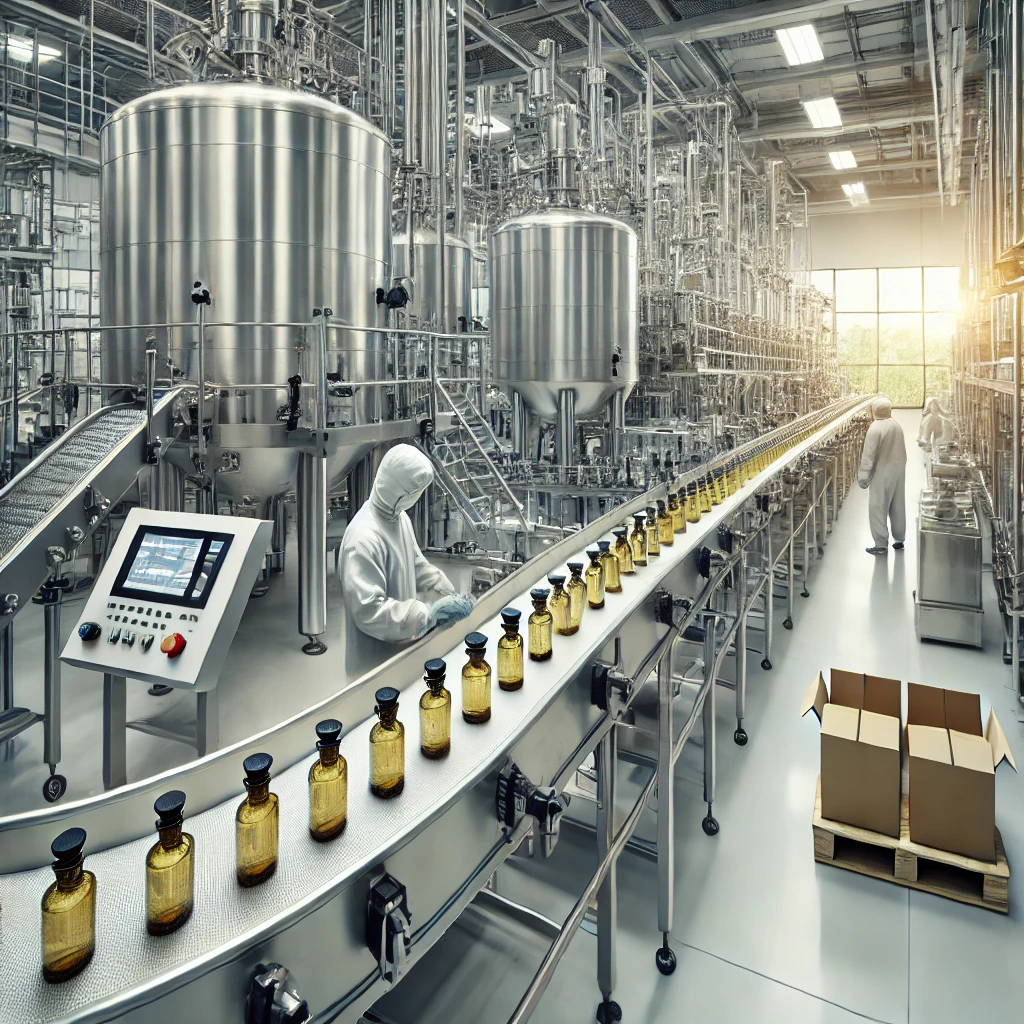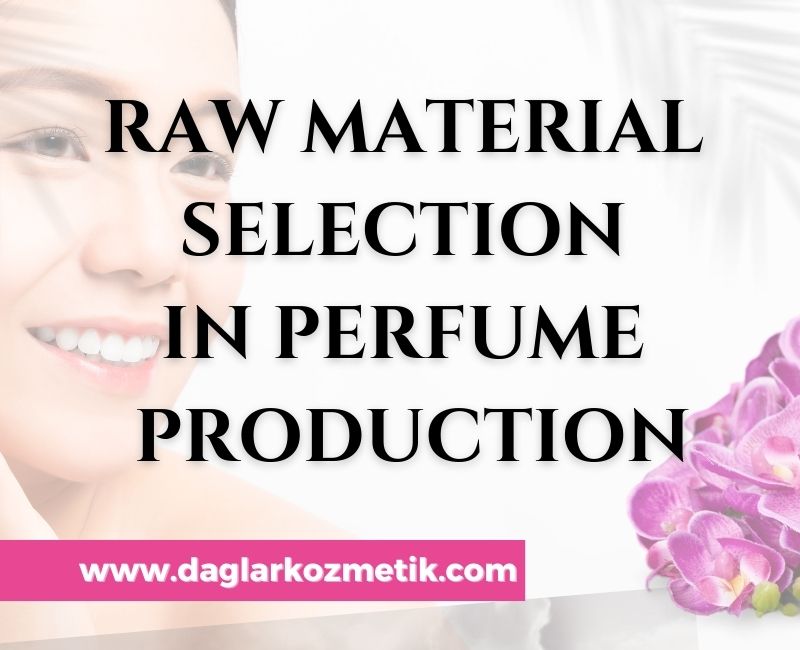Raw Material Selection in Perfume Production
The selection of raw materials in perfume production can be considered an art and a science. The perfect scent of a perfume is directly influenced not only by a good formulation but also by the quality of the raw materials. As a contract manufacturer in the cosmetics industry, you must make the right raw material choices to produce unique and high quality perfumes that meet customer demands. However, it is not enough just to choose the raw materials, it is also very important to rigorously apply quality standards at every step of the supply chain.
Natural and Synthetic Raw Materials: The Chemistry of Perfume
The choice of raw materials in perfume production, the raw materials used are divided into two main categories: natural and synthetic. Natural raw materials are derived from plants, flowers, resins and some animal sources. Such raw materials add depth and naturalness to the perfume with their scents coming from nature. For example, natural ingredients such as rose oil or sandalwood oil are often preferred in perfumes. However, natural raw materials can be difficult and costly to obtain, which can be reflected in the price.
Synthetic raw materials are chemical compounds produced in a laboratory. They offer a wide range of fragrance profiles without the limitations of natural resources and are also more sustainable. For example, some notes, such as amber or musk, are sourced from animal sources, whereas synthetic alternatives are less harmful to the environment. The use of synthetic ingredients offers cost advantages, but also more freedom in fragrance creation.
Perfume Raw Material Quality and the Importance of the Source
The quality of each raw material directly affects the performance of the final product. Quality raw materials make a big difference to a perfume’s persistence, diffusion and overall user experience. For example, a low-quality essential oil can unbalance the perfume and

negatively affect the fragrance profile. Therefore, raw material suppliers should be carefully selected. Suppliers must have certificates and certifications that guarantee the quality of their products. Working with suppliers that produce in accordance with international quality standards such as ISO and GMP is critical in this process.
Choosing the right raw material in perfume production affects not only the beauty of the fragrance but also its safety. The raw materials used in the cosmetics industry should not cause allergic reactions, be compatible with the skin and contain ingredients that do not threaten the health of the user. For this reason, the quality control processes of companies should be carried out meticulously.
Quality Standards and Certification Process
As a contract manufacturer, adhering to quality standards should always be a priority. The raw materials and final products used in perfume production must be tested and certified according to specific quality standards. GMP (Good Manufacturing Practice) certification ensures that products are safe, effective and of high quality. Same perfume manufacturer quality management systems such as ISO 9001 also ensure quality at every stage of the production process.
Quality standards not only ensure the safety of the product, but are also vital for the reputation of the brand. Consumers trust certified products more, which increases brand loyalty. Certification also opens up products to international markets and increases their competitiveness.
Sustainable Supply Chain and Ethical Production
Sustainability and ethical values are also becoming increasingly important in perfume production. Consumers are now paying attention not only to the quality of products, but also to the impact of production processes on the environment and society. Therefore, the use of sustainable raw materials, ethical supply chain practices and environmentally friendly production techniques are prominent elements in perfume production.
In particular, sustainable sourcing of natural raw materials contributes to the protection of nature. For example, in the production of rose oil, plants directly from the field are grown and harvested using organic farming methods, minimizing environmental impact. In addition, collaborating with suppliers that work with fair trade practices contributes positively to both the environment and local communities.
Quality and Choosing the Right Raw Materials in Perfume Production Brings Success
Perfume production is not just a process of creating an aesthetic product; it also requires scientific rigor and high quality standards. Choosing the right raw materials is vital for the persistence, diffusion and overall quality of the perfume. At the same time, adhering to quality standards ensures that products are safe and user-friendly.
For this reason, choosing the right raw materials and meticulously approaching quality control processes in perfume production are critical factors that directly affect both the commercial success and the reputation of the final product in the eyes of the consumer.
What is the difference between natural and synthetic raw materials in perfume production?
Natural raw materials are derived from plants and animal sources, while synthetic raw materials are produced in a laboratory environment. Naturals depend on limited resources, while synthetics are more sustainable and diverse.
How does choosing the right raw material affect perfume quality?
High-quality raw materials increase the persistence and diffusion of the perfume, while low-quality raw materials can cause unbalanced scents.
Why are quality standards important in perfume production?
Quality standards ensure that products are safe, effective and of high quality. Certifications such as ISO and GMP ensure quality.
Which certifications should be used in perfume production?
Certifications such as GMP (Good Manufacturing Practices) and ISO 9001 guarantee quality and safety in production processes.
How are sustainable raw materials used in perfume production?
Raw materials from organically farmed plants are used in production processes that do not harm the environment, which ensures sustainability.
Why are synthetic raw materials preferred in perfume production?
Synthetic raw materials overcome the limitations of natural resources, provide more fragrance variety and offer cost advantages.
What should be considered in the procurement process of raw materials used in perfume production?
Raw materials must have quality certificates and be procured in accordance with sustainable and ethical supply chain principles.
Why are natural raw materials more costly?
Natural raw materials are more laborious to grow, harvest and process, and their costs are higher because they are sourced directly from nature.
How are quality control processes applied in perfume production?
Quality tests are carried out at all stages, from the procurement of raw materials to the final product, checking the persistence, diffusion and safety of the fragrance.
Why are ethical values important in perfume production?
Ethical production ensures a sustainable production process that does not harm nature and people and is more preferred by consumers.

